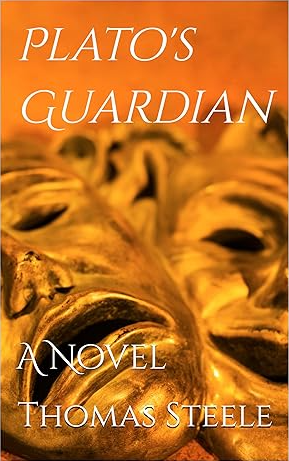Plato’s Guardian – Book Review

I was very happy to receive another reader copy from author Thomas Steele. And I’m looking forward to telling you more about this book, Plato’s Guardian. But first and foremost, it’s important to note that this book is very dark and deals with some very troubling subject matter. It’s not for everyone – so be warned of that going in.
I’ll give you more of a breakdown of what it’s all about and some ideas of what to expect, but proceed cautiously – especially if you are a sensitive reader. Now let’s dig into it!
When a man who has been pushed to the edge is eventually compelled to explain himself, what happens? Parole Officer Cleveland Ishmael, an unexpected narrator whose candid tone and penetrating criticism make this novel distinctive, allows readers to peer inside his unapologetic, brutally honest, and thought-provoking mind in Thomas Steele’s Plato’s Guardian.
A transcript of a disciplinary hearing in late 1999, in which Officer Ishmael is asked to explain his involvement in a string of gloomy and disorderly incidents that afflicted Kumhokot County, serves as the book’s deceptively straightforward framework. What emerges during his testimony, however, is far from straightforward. It’s a master class on psychological analysis, moral ambiguity, and character analysis.
Steele captures the sincere animosity of Ishmael from the very beginning of the hearing. Ishmael merely presents the facts as he sees them, ignoring decorum, appearances, or the reputations of individuals concerned. He makes no effort to please anyone. This direct delivery turns into one of the story’s main strengths, giving it a relentlessly noir feel, grit, and urgency.
This can be difficult for some readers, but it’s what I felt made it so original and raw.
In order to create a fictional universe that feels remarkably genuine, Steele skillfully interweaves rumors, controversy, and bureaucratic silliness throughout the interview. Kumhokot County, a place full of power conflicts, corruption, and morally complex individuals who embody the complexities of modern systems, comes to life via his memories.
Ishmael’s views regarding his own mental health, the parole system, and the fuzziness of the boundaries between personal collapse and professional accountability are fascinating, even though they are unsettling.
Plato’s Guardian stands out for its bold approach to difficult issues. Steele asks the reader to consider justice, loyalty, identity, and the convoluted, frequently unsettling ways that power functions through Ishmael’s voice. Beneath the procedural drama is a philosophical current that, although acknowledging Plato, more significantly asks the reader to distinguish between duty and self-destruction, truth and perception, and guardianship and control.
The writing is incisive and relentless. There’s not a boring spot in it, despite the transcript format. Ishmael feels very real, with a voice that is wounded, caustic, aggressive and sometimes even cynically poetic – but always relatable. The novel isn’t shy about the gruesome details, but if you’re willing to dive into the darker facets of human nature, you will be rewarded with a story full of depth and passion.
The editing and formatting are also excellent. Effective use of the transcript format reveals subtle variations in tone, body language, and the underlying tension between Ishmael and the interviewer. Steele maintains a tight grip on the speed, preventing the story from ever straying even as the narrative layers become more complex. Fans of gritty realism, character-driven stories, and unapologetic stories will love this one.
Final Thoughts:
The novel Plato’s Guardian is bold enough to convey a story that many people would rather not hear. It is equally made up of psychological drama, institutional critique, and philosophical inquiry, all viewed through the eyes of one interesting but deeply flawed person.
Highly recommended. But as the book says: you have been warned.
